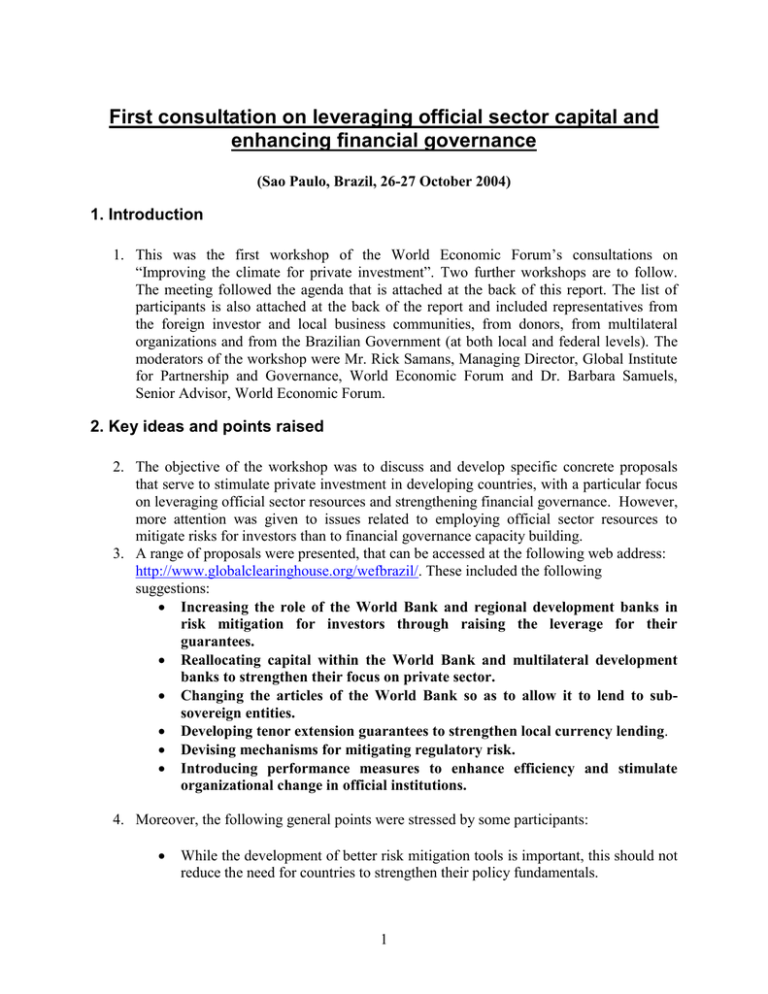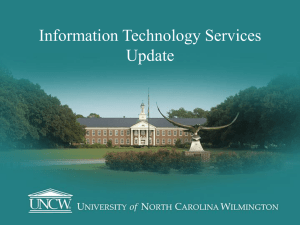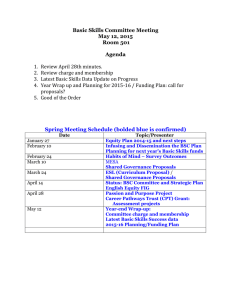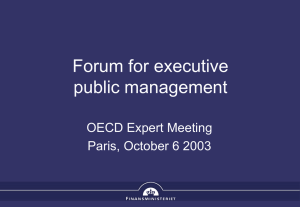First consultation on leveraging official sector capital and enhancing financial governance
advertisement

First consultation on leveraging official sector capital and enhancing financial governance (Sao Paulo, Brazil, 26-27 October 2004) 1. Introduction 1. This was the first workshop of the World Economic Forum’s consultations on “Improving the climate for private investment”. Two further workshops are to follow. The meeting followed the agenda that is attached at the back of this report. The list of participants is also attached at the back of the report and included representatives from the foreign investor and local business communities, from donors, from multilateral organizations and from the Brazilian Government (at both local and federal levels). The moderators of the workshop were Mr. Rick Samans, Managing Director, Global Institute for Partnership and Governance, World Economic Forum and Dr. Barbara Samuels, Senior Advisor, World Economic Forum. 2. Key ideas and points raised 2. The objective of the workshop was to discuss and develop specific concrete proposals that serve to stimulate private investment in developing countries, with a particular focus on leveraging official sector resources and strengthening financial governance. However, more attention was given to issues related to employing official sector resources to mitigate risks for investors than to financial governance capacity building. 3. A range of proposals were presented, that can be accessed at the following web address: http://www.globalclearinghouse.org/wefbrazil/. These included the following suggestions: Increasing the role of the World Bank and regional development banks in risk mitigation for investors through raising the leverage for their guarantees. Reallocating capital within the World Bank and multilateral development banks to strengthen their focus on private sector. Changing the articles of the World Bank so as to allow it to lend to subsovereign entities. Developing tenor extension guarantees to strengthen local currency lending. Devising mechanisms for mitigating regulatory risk. Introducing performance measures to enhance efficiency and stimulate organizational change in official institutions. 4. Moreover, the following general points were stressed by some participants: While the development of better risk mitigation tools is important, this should not reduce the need for countries to strengthen their policy fundamentals. 1 It is important to be clear about which risks should be borne by the private sector and which by the official sector. The difficulty, in many instances, of applying global solutions to local problems was pointed out. 3. Likely next steps 5. It was agreed that further work needed to be undertaken in evaluating and developing the ideas aired in the workshop, with the purpose of identifying those that are the most viable. However, it is also realized that, ultimately, the implementation depends upon political will. In this respect, it was suggested that a final step will be hold meeting(s) with the relevant political representatives from the boards of the multilateral organizations, donor agencies and political groupings to present the most viable proposals emerging from this and future workshops and discuss the possibility of their implementation. 2



